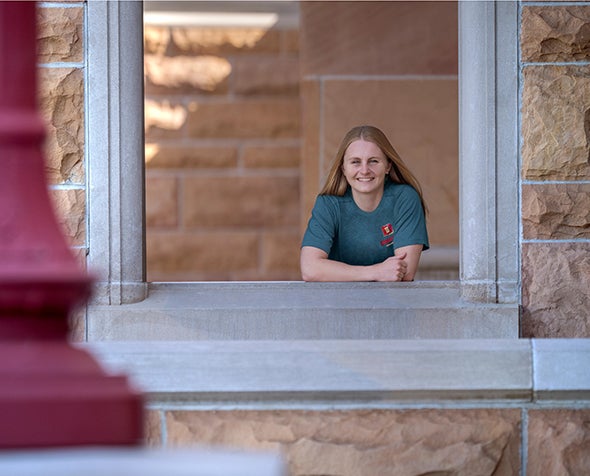Mindfulness and Music: How a GSPP Grad Makes a Difference in Young Lives
As a Tibetan American, Tenzin Tseten wants to give back to the community that made it possible for her to follow her dreams.

As a summer intern in Grenada teaching mindfulness and music to a group of teenage girls, Tenzin Tseten would start each day by “blasting music.”
Playing high-energy, positive music got the day off to a positive start, she says. “There’s something so beautiful about connecting with people over music, and I think a lot of words don't have to be said. It can just be something that you experience and feel together.”
One song—“Stand Up,” written by Cynthia Erivo for the movie “Harriet”—was particularly memorable for Tseten. It was the song the group performed when they closed their eight weeks together with an art and music showcase.
Tseten spent eight weeks in Grenada with a program called
Reach Within, based in the capital city of St. George’s. The organization focuses on promoting resilience in children, adolescents and young adults who have experienced trauma through an evidence-based curriculum that uses rhythmic activity including yoga, drumming, swimming and breathing exercises.
“I think the genuine way in which she showed up and shared (her love of music) with the girls allowed therapeutic alliance to occur and a connection to develop,” says Gwen Mitchell, associate professor and co-director of the International Disaster Psychology Program in DU’s Graduate School of Professional Psychology.
Tseten graduates in June with a Master of International Disaster Psychology: Global Mental Health and Trauma. It was the opportunity to apply what she learned in the classroom in a global setting that enticed her to DU’s program. Originally from the Chicago area, Tseten graduated from New York University in 2021 with a bachelor’s degree in psychology.
“It’s a very unique student that's drawn to this program, and she fits that profile and has really thrived,” Mitchell says. “Culturally affirming and responsive care is really something she’s natural at—as well as being a good thinker about where our pendulum is going and why.”
In addition to the support from her professors, Tseten has made quite a few close friends in her cohort and has leaned on them throughout the program.
“All of us are student therapists, so we can relate to the struggles that we go through … and also it’s been great to have people to connect and have fun with outside of school and work,” she says.
Always having had a passion for music, Tseten continues to find ways to use mindfulness and music in her everyday work when she can. For the past year, she has worked at the Asian Pacific Development Center, where she provides psychotherapy for Asian American and Pacific Islander (AAPI) clients.
This work has given Tseten a foundation for what her future career path may look like. As a Tibetan American, she would like to one day open an organization like the Asian Pacific Development Center and give back to her community.
“I'm so grateful for the past generations of not only my direct family lineage but also just the past generations of my Tibetan community, in general—for what they've done and what they have built to make sure that people of my generation … can explore things that they want to explore,” she says.
“I feel it's my responsibility to give back and try to heal a lot of the things that need to be addressed in our community.”












